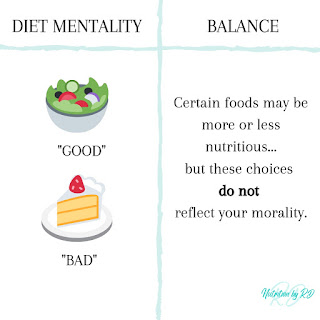At some point in our lives, most of us have probably said things
like, “that pasta is so good!” or “that milk is so bad!” Why? The milk might
have been spoiled or you simply don’t care to drink it. And the pasta might have
been the most flavorful thing you’ve ever tasted. Garlicky chicken fettuccine
Alfredo anyone? Absolutely amazing and GOOD!
Context is everything. There is a right time to say the words
“good” and “bad” and a not-so-great time to use those words when it comes to
talking about food. Why? What’s the line? Well, let’s have a little chat!
Appropriate times to label food as
good or bad:
- Good:
- Food
is delicious
- Bad:
- Food
is moldy
- Food
is spoiled
- Food
is rancid
Inappropriate times to label food as
good or bad:
- Good:
- Only
nutrient-dense foods like fruits, vegetables, whole grains, lean meats,
and unsaturated fats
- “Clean-eating”
- Bad:
- Desserts,
sweet treats, salty snacks, restaurant food/take-out, sugar, saturated
fat, fried foods
- “Cheat
meals”
Do you notice this black and white thinking? Have you ever thought
about the consequences of putting foods in categories that you “should” and
“shouldn’t” eat? Or can you think of someone you know who often says “Oh I was
so bad today. I had a piece of chocolate cake. I need to get back on track.” What
might this lead to if you use this language around your kids, your friends,
your spouse, your students, your clients, and on a regular basis?
This mindset of labeling food can quickly lead to a judgmental,
defensive attitude towards food and an intense fear of eating foods that an
individual had previously considered “bad” or “unhealthy.” We get bombarded
with headlines daily saying “100 Unhealthiest Foods on the Planet,” “15 Health Foods
that are Really Junk Foods in Disguise,” “20 Foods that are Bad for Your Health,”
or “7 Bad Foods that are Actually Good for You.” What are we supposed to do if
these are constantly in our minds? The first step is simply becoming aware
that food is not inherently good or bad in nature. Yes, there are
more nutrient-dense foods than others, but by no means do we need to
avoid the less nutrient-dense (and a lot of fun!) foods.
Avoidance leads to more restriction, restriction leads to
increased fear and unhealthy mindsets towards food, this unhealthy mindset
towards food leads to more disordered eating, and disordered eating can lead to
dangerous detours like avoiding social situations with foods, being scared to
go off of a meal plan, only allowing nutrient-dense foods in their diets,
influencing other people’s mindsets towards food, developing eating disorders,
and more. It’s a long domino effect that can be tricky to get out of if not
caught in the beginning.
GUESS WHAT? ALL foods can fit into a well-rounded balanced diet!
No foods need to be off limits unless there is a medical diagnosis preventing one
from being able to consume a food. Even as a soon-to-be Dietitian, I will
always preach about balance, moderation, and rejecting the diet mentality that
often comes with labeling foods as good or bad. When mindsets get shifted from
categorizing food in judgmental ways to being FREE to consume all foods in
moderation, the fear of enjoying treats diminishes, and the JOY of eating comes
back. And THAT is an amazing feeling, even if it takes some hard work to get
there again.
 |
| Labeling food as “bad” is can lead to a restrictive eating lifestyle and fear of food. Let’s ditch these labels and work on tweaking our thought processes around food! |
If you’re a parent, teacher, coach, doctor, friend…okay if you are
a living and breathing human being, let’s all try to speak in a more positive
light around food and help each other out when we start falling into that
domino effect of labeling food as “good” or “bad” or telling ourselves “I have
no willpower when it comes to food.” No one is going to be perfect, but we can all
continue improving how we speak about food, which can increase the prevalence of
healthy relationships with food and bodies, and regain the freedom and joy that
is brought about by eating meals with loved ones or by ourselves, at
restaurants or in our dining rooms.
For more information on steps to having a healthier relationship with food and rejecting this diet mentality language, visit the website below on Intuitive Eating and talk about what you learn with your friends and family! https://www.intuitiveeating.org/10-principles-of-intuitive-eating/
References:
10
Principles of Intuitive Eating. (2019, December 19). Retrieved October 23,
2020, from https://www.intuitiveeating.org/10-principles-of-intuitive-eating/
Photos:
Nair,
G. (2019, July 10). Crazy Head Comics: 21-year-old Swedish artist draws
cartoons to promote mental health awareness. Retrieved October 23, 2020, from
https://theadelaidelife.com/home/crazy-head-comics-21-year-old-swedish-artist-draws-cartoons-to-promote-mental-health-awareness
Rebecca,
& *, N. (2019, December 07). Labeling Food as Good vs. Bad and How to Ditch
It. Retrieved October 23, 2020, from https://nutritionbyrd.com/why-labeling-food-as-bad-vs-good-is-harming-your-health-happiness-and-what-to-do-instead/








